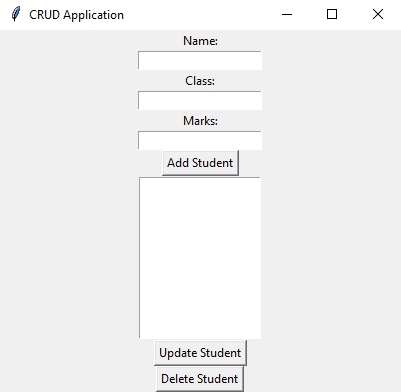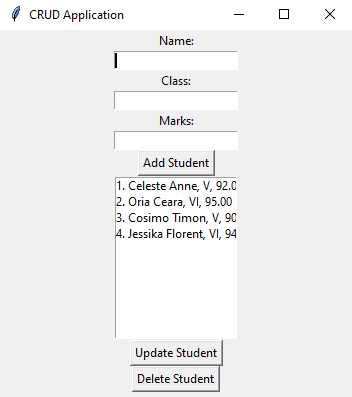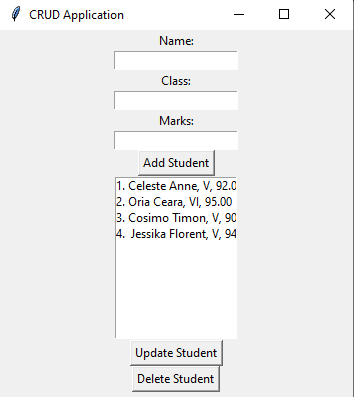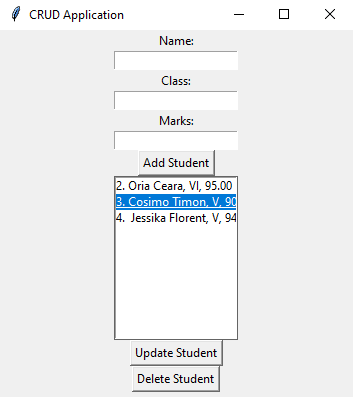Python Tkinter CRUD application with SQLite
Write a Python program that implements CRUD (Create, Read, Update, Delete) operations using Tkinter and a database.

Sample Solution:
Python Code:
import tkinter as tk
import sqlite3
from tkinter import messagebox
class CRUDApp:
def __init__(self, root):
self.root = root
self.root.title("CRUD Application")
# Create a database or connect to an existing one
self.conn = sqlite3.connect("school.db")
self.cursor = self.conn.cursor()
# Create a table if it doesn't exist
self.cursor.execute('''CREATE TABLE IF NOT EXISTS students (
id INTEGER PRIMARY KEY,
name TEXT,
stclass TEXT,
marks REAL
)''')
self.conn.commit()
# Create GUI elements
self.name_label = tk.Label(root, text="Name:")
self.name_label.pack()
self.name_entry = tk.Entry(root)
self.name_entry.pack()
self.position_label = tk.Label(root, text="Class:")
self.position_label.pack()
self.stclass_entry = tk.Entry(root)
self.stclass_entry.pack()
self.salary_label = tk.Label(root, text="Marks:")
self.salary_label.pack()
self.marks_entry = tk.Entry(root)
self.marks_entry.pack()
self.add_button = tk.Button(root, text="Add Student", command=self.add_student)
self.add_button.pack()
self.student_listbox = tk.Listbox(root)
self.student_listbox.pack()
self.load_students()
self.update_button = tk.Button(root, text="Update Student", command=self.update_student)
self.update_button.pack()
self.delete_button = tk.Button(root, text="Delete Student", command=self.delete_student)
self.delete_button.pack()
def add_student(self):
name = self.name_entry.get()
stclass = self.stclass_entry.get()
marks = self.marks_entry.get()
if name and stclass and marks:
#self.cursor.execute("INSERT INTO students (name, class, marks) VALUES (?, ?, ?)", (name, class, marks))
self.cursor.execute("INSERT INTO students (name, stclass, marks) VALUES (?, ?, ?)", (name, stclass, marks))
self.conn.commit()
self.load_students()
self.clear_entries()
else:
messagebox.showwarning("Warning", "Please fill in all fields.")
def load_students(self):
self.student_listbox.delete(0, tk.END)
self.cursor.execute("SELECT * FROM students")
students = self.cursor.fetchall()
for row in students:
self.student_listbox.insert(tk.END, f"{row[0]}. {row[1]}, {row[2]}, {'%.2f' % float(row[3])}")
def clear_entries(self):
self.name_entry.delete(0, tk.END)
self.stclass_entry.delete(0, tk.END)
self.marks_entry.delete(0, tk.END)
def update_student(self):
selected_student = self.student_listbox.get(tk.ACTIVE)
if selected_student:
student_id = int(selected_student.split(".")[0])
name = self.name_entry.get()
stclass = self.stclass_entry.get()
marks = self.marks_entry.get()
if name and stclass and marks:
self.cursor.execute("UPDATE students SET name=?, stclass=?, marks=? WHERE id=?", (name, stclass, marks, student_id))
self.conn.commit()
self.load_students()
self.clear_entries()
else:
messagebox.showwarning("Warning", "Please fill in all fields.")
else:
messagebox.showwarning("Warning", "Please select an student to update.")
def delete_student(self):
selected_student = self.student_listbox.get(tk.ACTIVE)
if selected_student:
student_id = int(selected_student.split(".")[0])
self.cursor.execute("DELETE FROM students WHERE id=?", (student_id,))
self.conn.commit()
self.load_students()
self.clear_entries()
else:
messagebox.showwarning("Warning", "Please select an student to delete.")
def __del__(self):
self.conn.close()
if __name__ == "__main__":
root = tk.Tk()
app = CRUDApp(root)
root.mainloop()
Explanation:
In the exercise above -
- Import the necessary modules.
- Initialize the Tkinter app: The CRUDApp class is defined, which represents the main application. The constructor (__init__) sets up the main application window, initializes the database connection, and creates GUI elements.
- Create a SQLite database "school.db" (or create it if it doesn't exist) and define a table named "students" with columns for student information, including name, class, and marks.
- Create GUI elements include labels, entry fields, buttons, and a listbox to display student records.
- Implement CRUD operations:
- add_student: Adds a new student record to the database when the "Add Student" button is clicked. It checks if all required fields (name, class, and marks) are filled before inserting data.
- load_students: Loads and displays student records from the database in the listbox.
- clear_entries: Clears the input fields.
- update_student: Updates an existing student record when the "Update Student" button is clicked. It also validates the input fields.
- delete_student: Deletes a selected student record when the "Delete Student" button is clicked.
- Database interaction: The program uses SQLite database queries to "insert", "update", and "delete" student records and fetches records to display in the listbox.
- Cleanup: The "del()" method ensures that the database connection is closed when the program exits.
- Main loop: Finally, the program checks if it's being run as the main module and starts the Tkinter main loop.
Output:
Flowchart:
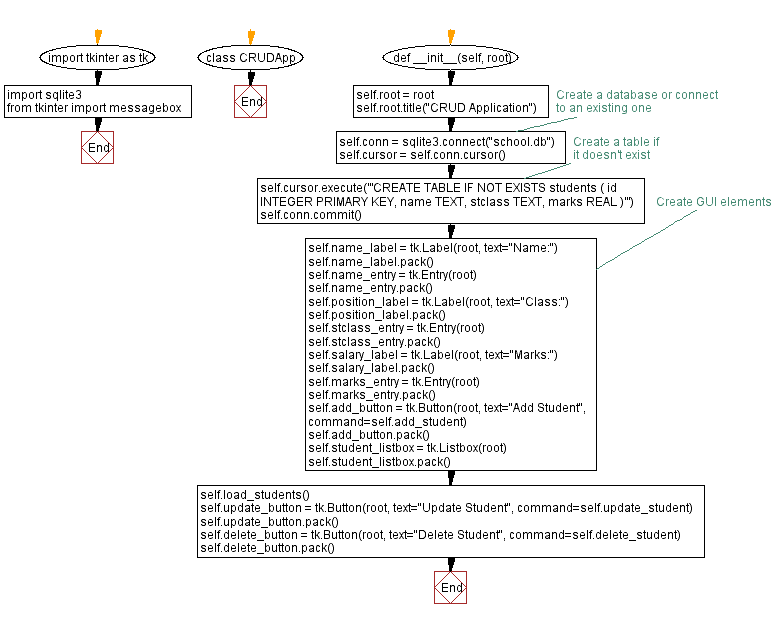
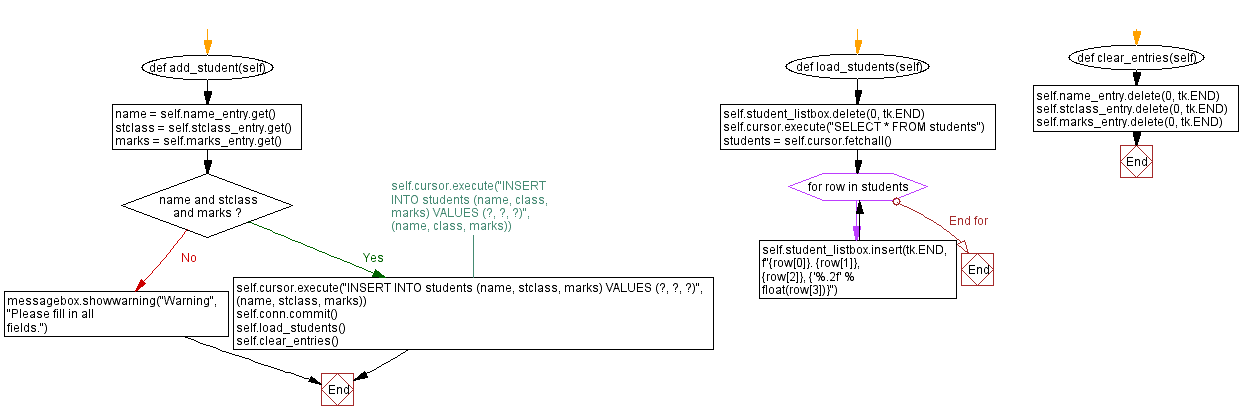
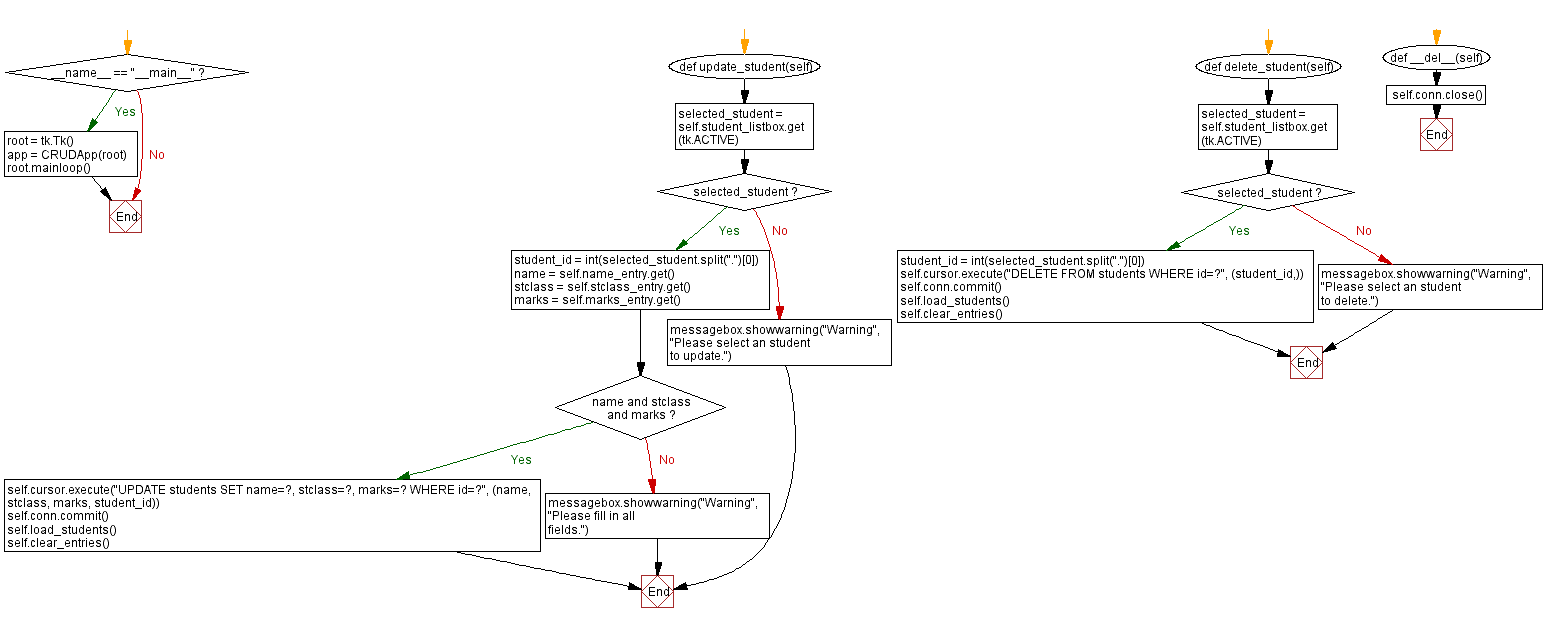
Go to:
Previous: Python SQLite database with Tkinter.
Next: Python PyQt Basic Exercises Home.
Python Code Editor:
What is the difficulty level of this exercise?
Test your Programming skills with w3resource's quiz.

